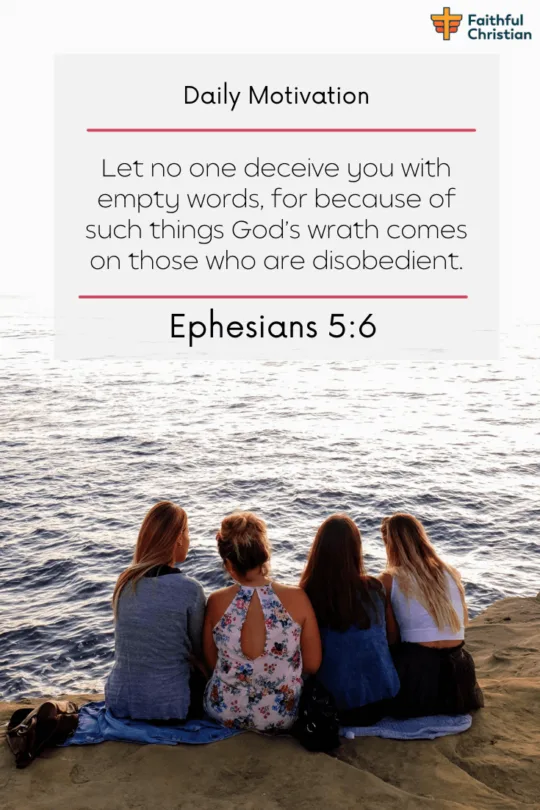The kind of friends you keep says a lot about you.
Bad friends can negatively affect you in almost everything you do.
They can affect your behaviors, your carrier, and your service to God.
Even worse, they could be jealous of you and try to hurt you.
Therefore, we must be careful with the kind of friends we keep.
That’s where bible verses about bad friends can be of help.
There are many scriptures in the bible that teaches us the characteristics of bad friends.
In summary, a bad friend negatively influences your life, and they care less about your success.
They talk badly about you to others and always find an opportunity to take advantage of you.
I have had some really bad friends when growing up.
And it negatively changed my life and my behaviors.
For example, for about four years in medical school, I was addicted to smoking.
And it all started because of my constant relationship with bad friends.
This negative influence affected me in all areas of my life.
Gradually, I started clubbing and fornicating.
And it didn’t stop there.
My life took a downturn, and I was lucky I still passed my exams in medical school.
But somehow, God intervened to help me.
If you are struggling with bad influence over your life or that of your children, You must pray.
God is willing to help you make the right decisions.
I have put together bible verses about negative influences and bad friends to help you.
Recommended for you
- Bible Verses About Fake Friends
- Intercessory prayer for drug addicts
- Powerful Encouraging prayer for friends and loved ones
- Bible verses about best friends
Bible verses about bad friends

1. 1 Corinthians 15:32-34

Do not be misled: “Bad company corrupts good character.” 34 Come back to your senses as you ought, and stop sinning; for there are some who are ignorant of God—I say this to your shame
Paul’s words in 1 Corinthians 15:33-34 are a clear warning. “Bad company corrupts good character,” he cautions. We’re told to shun harmful influences. These influences can corrupt us, steer us off track, dampen our spirits.
Galatians 5:9 speaks to this theme. It likens negative influence to yeast. A small amount can alter the entire dough. It’s potent. It’s invasive. It’s impactful. We should be wary.
Visualize climbing a mountain. Your partner’s negative attitude drains your energy. They say you can’t make it. They point out the dangers. Your enthusiasm fades. The power of negative influence comes alive. It can change challenges into insurmountable walls.
Proverbs 22:24-25 echoes the sentiment. It warns against keeping angry company. We risk adopting their ways, and once adopted, it’s a difficult snare to escape from. Negativity breeds negativity.
Reflecting on this, I find myself contemplating the story of Judas Iscariot, a disciple who walked with Jesus Himself.
Despite the extraordinary privilege of being in Christ’s inner circle, Judas succumbed to greed, a negative trait that led him to betray his Master. It’s a chilling reminder of the strength of negative influences, even in the face of overwhelming good.
In real life, the story of students, focused and eager to learn, brings this truth closer to home. When they start to mingle with classmates who dismiss education’s value, their grades begin to plummet.
These friends mock the effort it takes to study, calling it ‘uncool,’ and slowly but surely, the student’s passion for learning diminishes. This real-life scenario paints a clear picture of how bad company can derail us from our paths.
Paul’s message from centuries ago still holds true. We must choose our friends wisely. They shape us. They influence us. We must seek companions who inspire and uplift. I believe we need to steer clear of negativity and walk towards the light of positive influences.
In conclusion, our company matters. The sooner we step away from negativity, the better. It saves us regret. I urge us to surround ourselves with goodness. We need companions that reflect our desired self.
As Paul wisely stated, bad company can indeed corrupt good character.
2. Proverbs 13:20

Walk with the wise and become wise,
for a companion of fools suffers harm.
Proverbs 13:20 imparts enduring wisdom, “Walk with the wise to gain wisdom, but the companion of fools suffers harm.” This adage extends beyond physical companionship. It urges us to align with those radiating wisdom through their actions, decisions, and words.
Remember, wisdom isn’t a destination; it’s an ongoing journey. It is enriched by the company we keep.
However, pairing with the wrong crowd brings trouble. Take Solomon’s example, once known for wisdom, he was swayed by his pagan wives, leading to his downfall. This story teaches us that without discernment, negative influences can pull even the strongest astray.
In a similar vein, I know of a young adult who fell into the trap of drug experimentation due to peer influence. Once a promising student, he ended up jeopardizing his future. It’s a somber reminder that the consequences of negative influences aren’t confined to biblical times but are very real and present in today’s world.
How do we avoid such scenarios? The Bible guides us here. 2 Corinthians 6:14 cautions against bonding with those who contradict our values. It promotes spiritual discernment in choosing friends.
Similarly, Psalms 1:1 extols those who resist wicked influences. It isn’t about self-righteousness; it’s about mindful selection of the company we keep.
Both scriptures, combined with Proverbs 13:20, accentuate the value of wisdom through association. They call us to surround ourselves with enriching influences for our spiritual growth.
In conclusion, the company we keep significantly impacts our spiritual journey. We’re urged to walk with the wise, promoting positive influence, aiding our wisdom, and steering clear of harm.
We’re shaped by our associations – let’s choose them wisely.
3. Matthew 24:4

Jesus answered: “Watch out that no one deceives you.
In the Biblical narrative, Matthew 24:4 resonates as a timely warning. Jesus alerts His disciples about the prevalence of deception, particularly in the end times. The danger of straying from the path of righteousness escalates when we let negative influences or misguided friendships into our lives.
Consider the tale of Eve in the Garden of Eden, a prime biblical example of deception and negative influence. We see the serpent, the epitome of negative influence, slithering into Eve’s world. With smooth words and persuasive arguments, the serpent presents a twisted version of God’s command.
Eve, lacking spiritual discernment, yields to this deception. It’s not just an apple she takes; she imbibes falsehood, setting humanity onto a path of sin and separation from God.
Negative influences in our contemporary world often appear less dramatic, but equally destructive. They might come as insincere friends, manipulative individuals, or scam artists. Their victims, devoid of discernment, are lured into damaging situations.
For instance, consider an unsuspecting individual deceived by a skillful fraudster’s lies. Devoid of a grounding reality, they become prey to deception. Spiritual discernment becomes a lifeline in this chaos. Ephesians 5:11 emphasizes avoiding and exposing the fruitless deeds of darkness.
Acquiring discernment requires a deep dive into God’s Word. It serves as our bulwark against the tide of deception. As 2 Timothy 3:13 underlines, impostors will increasingly deceive. Yet, those grounded in Scripture possess the defense mechanism to counter this threat.
Guarding oneself from deception calls for vigilance and proactive behavior. It involves constant mental renewal, anchoring ourselves in God’s truth, and engaging with a community promoting spiritual growth. It’s challenging but promises an unshackled life and deeper communion with God.
In summary, Jesus’ directive in Matthew 24:4 is a crucial reminder. Amidst the cacophony of life, we must guard ourselves against the trickery that negative influences might sow.
By developing spiritual discernment, rooting ourselves in God’s Word, and actively protecting our minds, we can counter deception and embrace the freedom that God offers.
4. 1 Corinthians 5:6

Your boasting is not good. Don’t you know that a little yeast leavens the whole batch of dough?
The verse, 1 Corinthians 5:6, delivers a potent message about negative influence and its potential ripple effects. It employs the powerful metaphor of yeast, a small entity causing significant change.
Yeast, in the Bible, symbolizes elements of negativity or sin. These small actions or words, much like yeast in dough, can trigger a domino effect of negativity. James 3:8 echoes this concept, indicating that untamed language can spread damaging influence, much like yeast.
In our exploration of the spreading nature of negativity, we are reminded of the story of Achan in Joshua 7. He disobeyed God’s command and took some of the devoted things after the fall of Jericho.
Achan’s single act of disobedience caused defeat for the entire nation of Israel in their next battle. His sin, like yeast, affected the entire community, showing how our actions can profoundly impact those around us.
A modern parallel exists in office environments. Picture a team member with consistent negativity. Initially inconsequential, this behavior gradually erodes team morale and productivity. What starts as an isolated issue can soon permeate an entire team, much like yeast in dough.
So, how does one guard against such influences? Hebrews 12:15 provides guidance: vigilance and proactive nurturing of our spiritual lives help root out negativity. It’s crucial to detect and rectify negativity early, whether it’s within us or from others.
Ultimately, tackling negative influences is a communal task. A collective culture of positivity, respect, and wisdom can suppress negativity’s spread. The community has a shared responsibility to keep each other in check and uphold a positive atmosphere.
In essence, remember the yeast’s power. Be mindful of our words and actions and their potential impact. It’s not just about self-guarding; it’s about safeguarding the community too. Even a little yeast can leaven an entire batch of dough.
5. Ephesians 5:6

Let no one deceive you with empty words, for because of such things God’s wrath comes on those who are disobedient.
Paul’s letter to the Ephesians carries a warning that remains relevant today: “Let no one deceive you with empty words” (Ephesians 5:6). This admonition cautions us against false teachings and harmful influences that often originate from seemingly harmless words.
Consider our society today. It’s teeming with persuasive personalities who captivate audiences with captivating narratives. Yet, beneath their charisma, they may be peddling harmful misinformation and ideologies. This is not a new phenomenon.
The Pharisees, influential religious leaders of ancient Israel, were notorious for this. They led many astray with their deceptive teachings, displaying the power of negative influence.
Today’s world offers parallel examples. Charismatic leaders have misled the masses, spreading harmful ideologies under the guise of promising visions. The unsuspecting followers, lured by grand promises, find themselves entrapped in a web of deceit and manipulation.
Protection against such deception lies in standing firm in our faith. This unwavering foundation helps us resist the lure of enticing yet empty rhetoric.
As I see it, our faith is like an anchor in a storm. Despite the chaos around us, it holds us steady, preventing us from being swept away.
Discernment plays a critical role in this. Paul’s advice rings clear: “See to it that no one takes you captive through hollow and deceptive philosophy…” (Colossians 2:8).
This calls for vigilance, a careful scrutiny of words and actions of those around us. Echoing this, Jesus warns us to “Beware of false prophets” (Matthew 7:15), reinforcing the need for discernment.
The correlation between empty words and negative influences is unsettling. Much like a tree, they seem harmless on the surface.
Yet, their roots can spread, grow, and bear the bitter fruit of deception. Therefore, I urge you to guard against empty words and negative influences.
Amidst the clamor of countless voices, it is the voice of Truth we must strive to discern and follow.
6. 1 Corinthians 6:9

Or do you not know that wrongdoers will not inherit the kingdom of God? Do not be deceived: Neither the sexually immoral nor idolaters nor adulterers nor men who have sex with men
God’s kingdom is an inheritance with strict conditions. 1 Corinthians 6:9 is clear; unrighteous people won’t inherit it. This sobering message underscores the danger of unrighteous behavior often fueled by negative influences.
The Bible is replete with such warnings. Galatians 5:21 lists behaviors that block our access to God’s kingdom, from envy to drunkenness, typically resulting from negative societal pressures or poor companionship.
Let’s consider the biblical story of King Saul. Now here was a man chosen by God to be Israel’s first king, someone who started his journey on a promising note. But over time, Saul started listening to those around him more than to God’s commands.
These negative influences led him to make decisions that were disobedient to God, like unlawfully performing a sacrifice instead of waiting for the prophet Samuel (1 Samuel 13). This disobedience marked the beginning of his downfall.
Shifting gears to our world, you may recall instances where a well-respected individual was found involved in illegal activities. We often hear of celebrities or public figures who, due to the negative influence of their inner circle, find themselves on the wrong side of the law.
These real-life examples highlight the importance of the company we keep and the potentially disastrous consequences of yielding to negative influences.
Yet, these examples aren’t meant to scare but to emphasize the importance of transformation and righteousness. They remind us to shun societal pressures leading us astray. Ephesians 5:5 mirrors this principle, stating that those indulging in immorality or greed won’t inherit God’s kingdom.
However, amidst these stern warnings, there is hope. The kingdom isn’t only for the flawless; it’s for those choosing to turn from unrighteous behavior.
This turning isn’t a one-time event. It’s an ongoing journey of consistently choosing righteousness over negative influences. This journey, fortified by God’s grace, leads to a beautiful promise—the promise of inheriting God’s kingdom.
Therefore, we must be mindful of our choices and influences, as the kingdom of God is a priceless promise not to be forfeited.
7. Proverbs 9:6

Leave your simple ways and you will live;
walk in the way of insight.”
Proverbs 9:6 urges us to leave foolishness behind and embrace wisdom. This verse is a cornerstone, setting the path for insightful living.
Samson, a biblical figure famed for his great strength, fell short when it came to implementing this wisdom. Despite being set apart as a Nazarite from birth and endowed with immense physical power, he succumbed to the charm of Delilah. He disregarded the divine wisdom given to him, and this led to his downfall.
Similarly, in our world, we witness countless individuals gifted with immense talent and potential, yet they let negative influences sway them. Take the example of a talented athlete. The field and the cheering crowd offer them a realm where they reign supreme.
Yet, when the negative influence of excessive partying and neglect of disciplined training takes hold, the kingdom they could rule begins to crumble.
We’re taught by 2 Timothy 2:22 to “flee the evil desires of youth.” It’s a guide to shun harmful distractions while embracing virtues like righteousness, faith, love, and peace. This verse illuminates a dual strategy—I push away harmful desires and pull in virtues that foster growth.
1 Peter 1:14 teaches us not to conform to evil desires. Once, we were ignorant of wisdom’s light. Now, we can choose. I urge you, choose insight. This choice brings an enriched life filled with wisdom and growth.
Remember, our choices shape our life’s course. As Proverbs 9:6 suggests, we must choose wisdom over folly. This choice is personal, a responsibility that lies solely within our hands.
Think about Samson again. His poor choices cost him his strength, sight, and life. The choice of wisdom might have given him a different fate.
Choosing wisdom protects us from harm and enables us to tackle life’s trials with discernment. It guides us towards growth-oriented decisions. The disciplined pursuit of wisdom, as emphasized in Proverbs 9:6, results in a life of understanding.
In conclusion, Proverbs 9:6 and its related scriptures underline the need for discipline and discernment. Leaving behind simplicity, resisting negative influences, and pursuing wisdom—these define a fulfilling life. It’s a challenging path, but one leading to a life rich in wisdom and peace.
8. Galatians 6:7

Do not be deceived: God cannot be mocked. A man reaps what he sows.
The biblical verse, Galatians 6:7, asserts, “God cannot be mocked. A man reaps what he sows.” This is no empty phrase. It’s a profound life principle. Essentially, it teaches that actions yield consequences. This law applies universally, including when we succumb to negative influences or poor choices.
Let’s consider Ananias and Sapphira. They decided to deceive the apostles and the Holy Spirit. They lied about the sale price of a property. The outcome? Both lost their lives. It was a direct consequence of their spiritual sowing.
In the real world, this principle manifests often. Picture someone consistently sowing seeds of disdain and disregard. This person may end up alone, friendless. They have reaped the loneliness sown by their mistreatment of others.
Galatians 6:7 also compares sowing for the flesh and for the Spirit. The former involves acts of deceit and manipulation. However, such a path yields destruction. Sowing for the Spirit means acting in love and peace. This path, although often difficult, leads to righteousness.
To sow for the Spirit, I suggest we need constant communion with God. This includes grounding ourselves in His Word and discerning our associations.
Every decision we make is a sown seed. It influences our lives and often the lives of others. So, I pose these questions: What seeds are you sowing? And what will you reap?
Let’s aim to sow wisely, mindful of the potential consequences. Remember, today’s seeds determine tomorrow’s harvest. Choose wisely.
9. Proverbs 16:28

A perverse person stirs up conflict,
and a gossip separates close friends.
Let’s delve into Proverbs 16:28, a verse underscoring the divisive impact of gossip. This proverb warns of the spark that can ignite conflict, turning close friends into strangers.
First, we must acknowledge the insidious danger of gossip. Proverbs 26:20 compares it to a spark that, without fuel, dies. Even the smallest gossip can stir up a conflict, fracturing friendships and disrupting unity. In my experience, an innocent comment or misunderstood whisper can seed distrust and disharmony.
Next, we should consider the individuals perpetuating gossip. James 3:5 likens the tongue to a small spark with the potential to ignite a massive fire, emphasizing how one person’s divisive behavior can create widespread discord.
Consider the biblical tale of Absalom, King David’s son. With his cunning and charisma, he manipulated words, causing a rebellion against his father and civil war in Israel. Absalom’s actions underscore the potential for destruction when deceit spreads unchecked.
In my own life, I’ve seen a friendship group fractured by the false rumors spread by one person. This scenario reflects the biblical lesson, reminding us of the ruinous potential of divisive behavior.
To combat this, unity and peace are vital in relationships. Gossip’s destructive nature can erode even the most harmonious community. By prioritizing unity and peace, we can create relationships resilient to discord.
Preventing and handling gossip begins with us. Promoting truth and understanding, embracing open communication, and resisting the temptation to spread unverified information are key.
In doing so, we build stronger, harmonious communities, resilient against the flames of discord.
In conclusion, no community is impervious to the effects of gossip. By understanding its destructive potential and making a commitment to unity, we can extinguish the spark before it becomes a fire.
Remember, the Word of God not only cautions us but equips us with the tools to navigate these challenges, fostering unity and harmony in our communities.
10. Proverbs 17:9

Whoever would foster love covers over an offense,
but whoever repeats the matter separates close friends.
In Proverbs 17:9, we find profound insight about relationships, “He who covers a transgression seeks love, but he who repeats a matter separates friends.” This verse encapsulates a crucial concept: forgiveness cultivates love. Conversely, dwelling on past wrongs can drive a wedge between even the closest of friends.
Take, for instance, Joseph’s biblical story. You may remember the tale – a young boy, his father’s favorite, adorned with a colorful coat and dreams of grandeur. But this favoritism bred deep-seated jealousy within his brothers, ultimately leading them to sell him into slavery.
Rather than choosing love and covering their sibling’s perceived offense, they amplified it, causing separation and heartbreak.
Yet, isn’t this a picture of many relationships today? Perhaps not as dramatic, but the essence remains. I know of a family, torn apart by a feud over a misinterpreted will.
What began as a misunderstanding has spanned generations, with children inheriting the resentment and bitterness of their parents. Rather than forgiving, they’ve chosen to nurse grudges, sowing discord in the family.
This scenario underscores the vital role of forgiveness in preserving relationships. Peter, in 1 Peter 4:8, affirms this, saying, “Above all, love each other deeply, because love covers a multitude of sins.”
By embracing forgiveness, we undermine the foundations of negativity and strife, building instead a fortress of unity and profound love.
However, forgiveness isn’t about ignoring wrongdoing. Rather, it’s about favoring unity over division. Colossians 3:13 elucidates this, instructing us to, “Bear with each other and forgive one another if any of you has a grievance against someone. Forgive as the Lord forgave you.”
As we navigate life, we must foster love by choosing forgiveness. This choice will lead to the dissolution of resentment, making way for unity and love. A friend who forgives propagates love, while one who harbors grudges nurtures division.
I encourage you, choose love, choose forgiveness. By doing so, we mirror the forgiveness we have received from God. Remember, our relationships’ health hinges significantly on our ability to forgive and love.
Recommended for you
- Bad company corrupts good character Bible verses
- Bible Verses About Friendship
- Scriptures about Stick Together as friends
- Bible verses about evil people
- 22 Bible verses about drinking Wine
More Bible Verses About Negative Influence
-
Proverbs 15:18 (NIV)
-
Proverbs 18:8 (NIV)
-
James 3:14-16 (NIV)
-
Romans 1:29 (NIV)
-
Matthew 5:30 (NIV)
-
Luke 17:2 (NIV)
-
Proverbs 17:17 (NIV)
-
Proverbs 18:24 (NIV)
-
John 15:13-14 (NIV)
-
Hebrews 2:11 (NIV)
-
2 Samuel 1:26 (NIV)
-
1 John 3:17 (NIV)
-
Hebrews 13:16 (NIV)
-
1 John 4:20 (NIV)
-
Deuteronomy 15:7-8 (NIV)
-
Proverbs 14:7 (NIV)
-
Ephesians 5:11 (NIV)
-
Proverbs 19:27 (NIV)
-
Proverbs 9:6 (NIV)
-
1 Corinthians 5:11 (NIV)
Recommended for you
How to identify bad influence friends
Toxic and evil friends can have a negative influence on our lives. So how can we tell if we have wicked friends?
1. They are selfish from the beginning
Have you ever needed anything from your friend, and he turns you down?
That’s one characteristic of a bad friend. They do not always help you when you need them but are quick to ask for your help when they face difficult times.
Don’t get me wrong; there are times when your close friends will not be able to assist you.
So, you must not tag those that cannot help you as bad friends.
Instead, watch how they behave over time.
Do they share any concerns about your problems?
Help could be in any form.
Calling to know how you are doing or figuring out ideas to get you through your issues are different ways to help.
If your friends aren’t showing any concern at all, that’s a bad sign.
Fake friends may act as they care but deep inside, they don’t.
2. They always want to talk about themselves
We all have issues.
And that’s the essence of friendship.
We need someone to talk to.
If you have friends that are unwilling to hear your problems, those are selfish friends.
Bad friends are self-centered.
They care more about your opinion on their issues and are likely not interested in discussing your problems.
3. They are a negative influence
Bad friends are terrible in all aspects.
Despite not helping you, they are likely to lead you astray.
They will definitely influence you to do the wrong things.
Some of which are against God’s commands and that of your parents.
You may find yourself fornicating, drinking excessively or taking drugs.
These are actions of sinners, and those are not the kind of Friends you need around as Christians.
4. Bad friends lie a lot
Telling the truth to your friend is more like the first rule of true friendship.
There is no reason to lie to someone you love.
So, if your friends keep lying to you, that’s a bad sign.
Frequently Asked Questions
Where in the Bible does it say bad friends corrupt good morals?
The New Testament, specifically in 1 Corinthians 15:33 (NIV), asserts “Do not be misled: ‘Bad company corrupts good character.'”
When God tells you to let go of a friendship?
Proverbs 22:24-25 (NIV) advises against befriending easily angered individuals as it can lead to personal ensnarement in their destructive ways.
What God has to say about friendships?
Proverbs 17:17 (NIV) and Ecclesiastes 4:9-10 (NIV) emphasize the importance of steadfast and supportive friendships, particularly during difficult times.
What does the Bible say about being friends with an angry man?
Proverbs 22:24-25 (NIV) offers a stern warning about befriending an individual prone to anger. It articulates, “Do not make friends with a hot-tempered person, do not associate with one easily angered, or you may learn their ways and get yourself ensnared.”
What does the Bible say about having bad friends?
The negative impacts of keeping bad company are noted in 1 Corinthians 15:33 (NIV). It reiterates, “Do not be misled: ‘Bad company corrupts good character.'”
What are the consequences of bad friendship?
Proverbs 13:20 (NIV) enumerates the fallout from poor friendships. It advises, “Walk with the wise and become wise, for a companion of fools suffers harm.”
What does Bible say about bad influences?
On the topic of negative influences, 1 Corinthians 15:33 (NIV) states, “Bad company corrupts good character.”
What God says about friends who hurt you?
Proverbs 27:6 (NIV) provides insights about friends who might cause pain, saying, “Wounds from a friend can be trusted, but an enemy multiplies kisses.”
What are some Bible verses about staying away from bad influences?
Psalm 1:1 (NIV) is an admonition on avoiding bad influences. It declares, “Blessed is the one who does not walk in step with the wicked or stand in the way that sinners take or sit in the company of mockers.”
Can you mention five evils of bad friendship according to the Bible?
According to the Bible, bad friendships can lead to five distinct perils: corruption of good morals (1 Corinthians 15:33), adoption of harmful habits (Proverbs 22:24-25), exposure to harm (Proverbs 13:20), susceptibility to temptation (Proverbs 1:10-19), and deviation from divine wisdom (Proverbs 14:7).
Are there any examples of bad friends mentioned in the Bible?
The betrayal of Jesus by Judas Iscariot is a biblical example of the destructive potential of bad friendships.
Which Bible verses talk about cutting off bad friends?
Matthew 5:30 (NIV), although not directly referring to friendship, symbolizes the necessity of removing anything causing one to sin, implying the importance of discarding detrimental friendships.
Are there any Bible verses about bad friends specifically in the King James Version (KJV)?
The King James Version (KJV) of the Bible provides a stark warning against maintaining poor friendships in Proverbs 13:20: “He that walketh with wise men shall be wise: but a companion of fools shall be destroyed.”
Can you provide examples of bad influences mentioned in the Bible?
The story of King Ahab and Jezebel illustrates how negative influence (in this case, leading to idolatry) can stem from harmful relationships.
What are some Bible verses that address the topic of bad influences?
Biblical verses addressing the subject of detrimental influences include 1 Corinthians 15:33, which states “Do not be misled: ‘Bad company corrupts good character,'” and Proverbs 22:24-25, advising against associating with an easily angered person. Both verses underscore the adverse impacts of poor influences.
Are there any examples of both good and bad friends mentioned in the Bible?
The Bible contains examples of both positive (Jonathan and David) and negative (Judas Iscariot and Jesus) friendships, emphasizing the importance of loyalty and warning against the consequences of betrayal, respectively.
